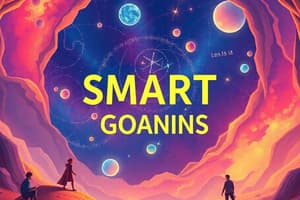Podcast
Questions and Answers
Which of the following is one of the guiding principles of learning?
Which of the following is one of the guiding principles of learning?
- Teaching is most effective when it focuses on isolated bits of information.
- Learning is a passive process.
- Good teaching relies solely on student participation.
- A non-threatening atmosphere enhances learning. (correct)
What is the primary emphasis of brain-based instructional strategies?
What is the primary emphasis of brain-based instructional strategies?
- Isolating information for easier recall.
- Engaging multiple senses to enhance learning. (correct)
- Using only traditional lecture methods for instruction.
- Encouraging competition among students.
Which method is included in the integrative strategies for teaching?
Which method is included in the integrative strategies for teaching?
- Standardized testing practices.
- Lecturing without interaction.
- Focusing exclusively on textbook readings.
- Simulations and role play. (correct)
What is a key component in teaching values effectively according to the content?
What is a key component in teaching values effectively according to the content?
Which statement is true regarding teaching strategies?
Which statement is true regarding teaching strategies?
What does the 'A' in SMART goals stand for?
What does the 'A' in SMART goals stand for?
Which domain includes the learning objectives related to physical abilities and skilled movements?
Which domain includes the learning objectives related to physical abilities and skilled movements?
Which of the following is NOT a key verb associated with the 'Create' level of Bloom's taxonomy?
Which of the following is NOT a key verb associated with the 'Create' level of Bloom's taxonomy?
In writing a lesson objective, which of the following should be included?
In writing a lesson objective, which of the following should be included?
Which learning outcome is associated with the verb 'Evaluate' in Bloom's taxonomy?
Which learning outcome is associated with the verb 'Evaluate' in Bloom's taxonomy?
Which of the following best describes the 'Affective' domain?
Which of the following best describes the 'Affective' domain?
Which of the following objectives focuses on application according to Bloom's taxonomy?
Which of the following objectives focuses on application according to Bloom's taxonomy?
Which of the following verbs is associated with the 'Analyze' level in Bloom's taxonomy?
Which of the following verbs is associated with the 'Analyze' level in Bloom's taxonomy?
What is the primary focus of the Direct Instruction approach?
What is the primary focus of the Direct Instruction approach?
Which method begins with generalizations and ends with specific examples?
Which method begins with generalizations and ends with specific examples?
What does the Project Method emphasize in education?
What does the Project Method emphasize in education?
Which method can help teachers maintain student engagement during a class?
Which method can help teachers maintain student engagement during a class?
What type of questioning is used primarily for assessing cognition?
What type of questioning is used primarily for assessing cognition?
Which of the following is NOT a characteristic of the Inquiry Approach?
Which of the following is NOT a characteristic of the Inquiry Approach?
Which approach primarily uses prior knowledge to construct new meanings?
Which approach primarily uses prior knowledge to construct new meanings?
Which strategy is least effective for creating a positive interaction in the classroom?
Which strategy is least effective for creating a positive interaction in the classroom?
What role does motivation play in learning?
What role does motivation play in learning?
What type of question would promote creative thinking among students?
What type of question would promote creative thinking among students?
How should feedback on student responses be delivered?
How should feedback on student responses be delivered?
Which of the following is characterized as a 'think-aloud' approach?
Which of the following is characterized as a 'think-aloud' approach?
Which example illustrates a high-level question that encourages deeper learning?
Which example illustrates a high-level question that encourages deeper learning?
Which strategy emphasizes group work while maintaining individual accountability?
Which strategy emphasizes group work while maintaining individual accountability?
Why is it important to sequence questions logically?
Why is it important to sequence questions logically?
What is an effective strategy for handling classroom disruption?
What is an effective strategy for handling classroom disruption?
What approach should be taken to encourage student questions?
What approach should be taken to encourage student questions?
What is the purpose of varying types of questions in the classroom?
What is the purpose of varying types of questions in the classroom?
How can a teacher effectively manage transitions in the classroom?
How can a teacher effectively manage transitions in the classroom?
What is the main goal of consistent, proactive discipline in the classroom?
What is the main goal of consistent, proactive discipline in the classroom?
What is a key aspect of praising high-quality student responses?
What is a key aspect of praising high-quality student responses?
Flashcards are hidden until you start studying
Study Notes
Planning & Executing the Lesson
- SMART goals are Specific, Measurable, Achievable, Relevant, and Time-bound.
Writing Lesson Objectives
-
Lesson objectives should align with three domains: Cognitive, Affective, and Psychomotor.
-
Cognitive: How students will use mental processes like recalling, understanding, applying, analyzing, creating, and evaluating information.
-
Affective: How students will demonstrate emotional responses like receiving, responding, valuing, organizing, and internalizing information.
-
Psychomotor: How students will develop physical skills through imitation, manipulation, precision, and communication.
Selection and Use of Teaching Strategies
-
Learning is an active process.
-
Multiple senses enhance learning.
-
A non-threatening environment promotes learning.
-
Emotions play a crucial role in retention and learning.
-
Good teaching goes beyond memorization.
-
An integrated approach is more effective than isolated teaching.
-
Learning is meaningful when connected to real life.
-
The best method is the one that works and produces results.
Integrative Strategies
-
Brain-based Instructional Strategies: Strategies using brain-friendly approaches to enhance learning.
-
Examples: Problem-solving, projects, simulations, visual processing, hands-on activities, songs, and mnemonics.
Different Approaches and Methods
-
Direct/Expositive Instruction Approach: Teacher-centered methods emphasizing direct transmission of information.
-
Methods: Direct instruction, deductive method, and demonstration method.
-
Guided/Exploratory Approach: Student-centered methods encouraging active learning and exploration.
-
Methods: Inquiry approach, problem-solving method, project method, metacognitive approach, constructivist approach, reflective teaching, cooperative learning, peer tutoring, and partner learning.
Motivation
-
Internal drive that prompts action.
-
Energizes, directs, and sustains behavior.
-
Engages learners in the learning process.
Motivational Strategies
-
Variety in teaching strategies.
-
Engaging activities like storytelling, poetry recitation, and contests.
-
Positive reinforcement and rewards.
-
Humor (used appropriately).
-
Pleasant personality and positive interaction.
-
Use of objects, equipment, models, and activities to keep learners engaged.
Effective Questioning
-
Different types of questions serve specific purposes: assessing cognition, verification, creative thinking, evaluation, productive thinking, motivation, and instruction.
-
Types of questions based on level/answer: Low level (basic), High level (abstract), Convergent (single answer), and Divergent (multiple possible answers).
Questioning Skills
-
Varying question types: open-ended, non-directed, etc.
-
Asking questions that require abstract thinking.
-
Calling on non-volunteers.
-
Allowing sufficient wait time.
-
Rephrasing or simplifying questions.
-
Assessing comprehension.
-
Sequencing questions logically.
-
Involving as many students as possible.
Handling Students’ Response
-
Providing feedback on responses: being tactful, giving hints, explaining the correct answer.
-
Giving appropriate praise for high-quality responses.
-
Making follow-up questions related to the previous question.
-
Redirecting questions to involve more students.
-
Showing non-verbal encouragement: gestures, eye contact, smiles.
-
Encouraging learners to ask questions.
Principles in Classroom Management
-
Consistent and proactive discipline.
-
Establishing routines for daily tasks.
-
Orchestrating smooth transitions.
-
Balancing variety and challenge in student activities.
-
Being aware of all actions in the classroom.
-
Resolving minor disruptions promptly.
-
Reinforcing positive behavior.
-
Treating minor disturbances calmly.
-
Arranging seating to facilitate interaction.
-
Maximizing instructional time by minimizing discipline time.
Studying That Suits You
Use AI to generate personalized quizzes and flashcards to suit your learning preferences.




